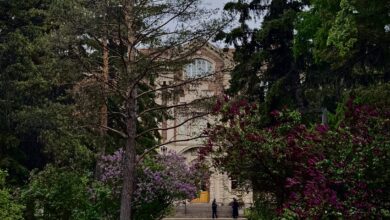 John Ulan
John UlanSlug control may soon become easier — thanks to nematode parasites.
Originally having a background in entomology, Lien Luong, associate professor at the University of Alberta, is the principal investigator of a study looking into facultative parasitism and its applications as a biological pest control.
A facultative parasite is a parasite that can be a free-living organism — an organism not directly dependent on other organisms for its survival — but under certain conditions, switch to a parasitic lifestyle.
“One of [facultative parasitic] systems that I came upon was a nematode parasite that infects slugs,” Luong said.
Luong’s research with slugs began in 2018 when a researcher from the United Kingdom reached out to the U of A’s biological sciences department to ask if anyone was interested in collaborating on a slug project.
“We started doing a survey of slugs in the central and northern Alberta area to see what kind of parasites they have,” Luong explained. “In 2019, my students and I collected over 2,000 slugs. We inspected all of them for parasites and, lo and behold, we found the nematode parasite.”
The nematode in question was from the genus Phasmarhabditis. According to Luong, a similar species of this nematode is available in the United Kingdom, Europe, and other parts of the world, but has yet to be commercialized as a pest control product in Canada.
This 2019 discovery of the nematode in slugs leads Luong to believe that nematode parasites could be a form of biological pest control in Canada soon.
“Now that we’ve been able to identify [the nematode] in Alberta it would no longer be considered invasive,” she said. “Before we can introduce it into the field as a biological control agent, we have to do experiments to assess the safety and efficacy of this nematode. We’ve been isolating the nematode, culturing it in our lab, and continuing to collect slugs for research.”
Luong and her team currently collect slugs within a two hour radius of Edmonton. Luong’s eventual goal is to survey as many different habitats in Alberta as possible and get a better understanding of the distribution of slugs and any associated nematodes from agricultural fields.
“Slugs are considered a pest in home gardens and agricultural environments,” Luong said. “In 2019, we surveyed home gardens extensively. This year we’ve really focused our data in nurseries and greenhouses and we started to survey agricultural fields like wheat, corn, [and] canola. At the same time, we’ll be doing laboratory experiments to better determine the biology, infectivity, and efficacy of this nematode as a biological control agent.”
Eventually, Luong would like to see her lab’s research move towards answering questions surrounding how and when organisms made the switch from free-living to parasitic lifestyles using the slug nematode system.
“One hypothesis is that the facultative parasites [serve] as an evolutionary stepping stone between free-living and parasitic lifestyles,” Luong informed.
“A facultative parasite is a very tantalizing possibility because they live on the margin between the two worlds. They can be free-living but then when they run out of food or conditions become unfavourable in the environment, then they can parasitize a host and find a whole new source of nutrients. That makes them a very interesting study organism from a basic science perspective.”



